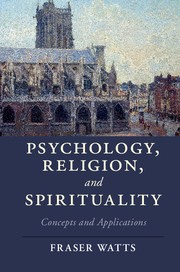Book contents
- Frontmatter
- Dedication
- Contents
- Preface
- 1 Concepts and Approaches
- 2 Psychoanalysis
- 3 Genetics and Evolution
- 4 Brain and Cognition
- 5 Religious Experience
- 6 Religious Practices
- 7 Religious Beliefs and Thinking
- 8 Spirituality
- 9 Developmental Aspects
- 10 Varieties and Types
- 11 Health and Adjustment
- 12 Personal Transformation
- 13 Scripture and Doctrine
- 14 Human Nature and Personality
- 15 Summing-Up
- Further Reading
- References
- Index
- Frontmatter
- Dedication
- Contents
- Preface
- 1 Concepts and Approaches
- 2 Psychoanalysis
- 3 Genetics and Evolution
- 4 Brain and Cognition
- 5 Religious Experience
- 6 Religious Practices
- 7 Religious Beliefs and Thinking
- 8 Spirituality
- 9 Developmental Aspects
- 10 Varieties and Types
- 11 Health and Adjustment
- 12 Personal Transformation
- 13 Scripture and Doctrine
- 14 Human Nature and Personality
- 15 Summing-Up
- Further Reading
- References
- Index
Summary
This chapter will focus on psychoanalytic approaches to religion. It will be important to consider not only Freud himself but also some post-Freudians, some of whom take a much more positive view of religion than Freud himself did. For convenience, I will include Jung in this chapter too, though strictly speaking, Jung's approach is termed “analytical psychology” rather than “psychoanalysis.”
Freud
Psychoanalysis operates with a general concept of religion, and, as we have already noted, psychoanalysis is one of the psychological perspectives that try to explain why people are religious at all, rather than just attending to particular religious phenomena. Most psychoanalytic thinking about religion fails to consider that different forms of religion may have psychological appeal for quite different reasons. It also fails to consider that some forms of religion may be pathological and others not. For Freud, it is all just “religion.”
Another problem that we need to note at the outset is that Freud has no single psychology of religion. It is a subject to which he returns frequently, which suggests that it had a certain fascination for him (for an overview, see Meissner, 1984). Each time he develops a somewhat different position, though these are not necessarily incompatible with one another. Two of his books on religion, Totem and Taboo and Moses and Monotheism, are based on such dated and unreliable anthropology that I will not say much about them here, though it is intriguing that he was interested enough in Moses to present his own unorthodox quasi-rabbinic interpretation of the Moses story.
Let us focus first on one of the key ideas in Freud's psychology of religion, God as projection. Freud suggests that God is a projection of the human mind, an idea that is to be found in a more general form in Feuerbach (2008/1841), though Freud developed it considerably by fleshing out the psychological mechanisms by which he thinks the projection arises. It is an idea that he treats most in his essay on Leonardo (Freud, 1965).
Freud seems to be unaware of a fundamental problem in his treatment of God as projection. It is one thing to argue that people's concepts of God are shaped to some extent by psychological processes that can be understood as projection.
- Type
- Chapter
- Information
- Psychology, Religion, and SpiritualityConcepts and Applications, pp. 13 - 24Publisher: Cambridge University PressPrint publication year: 2017

